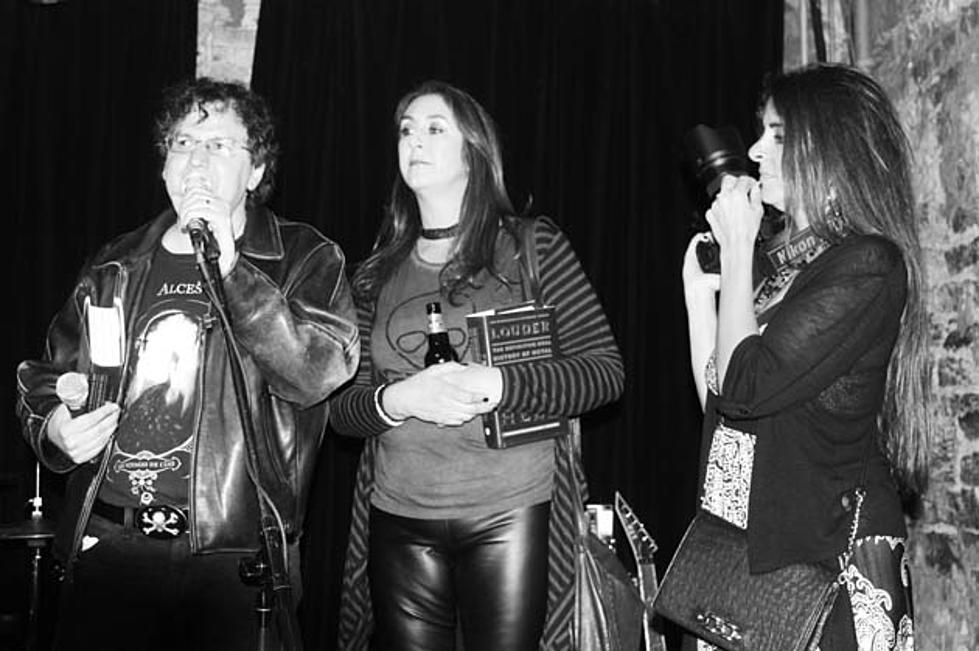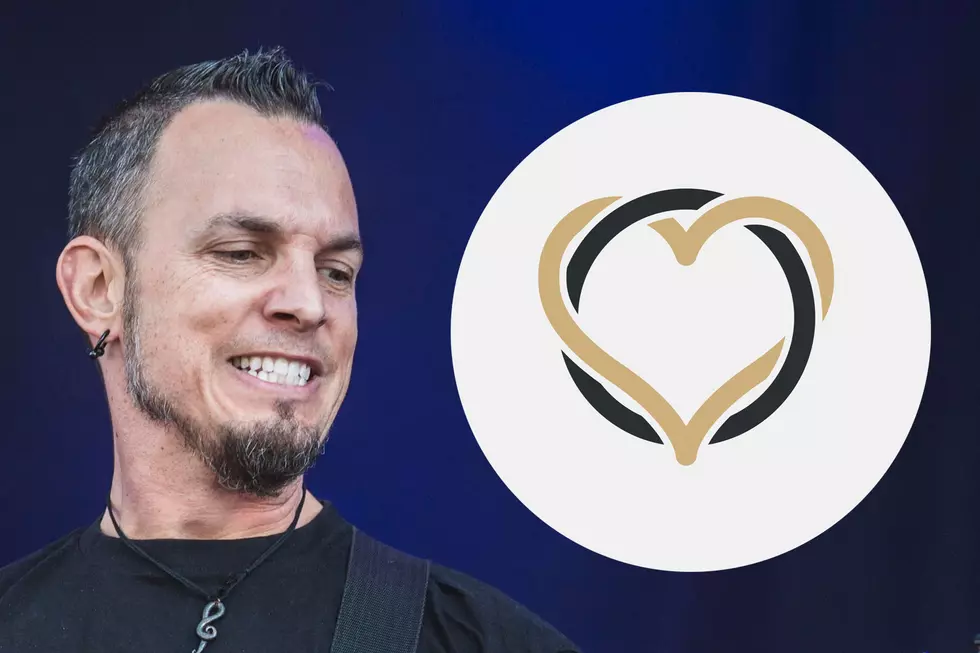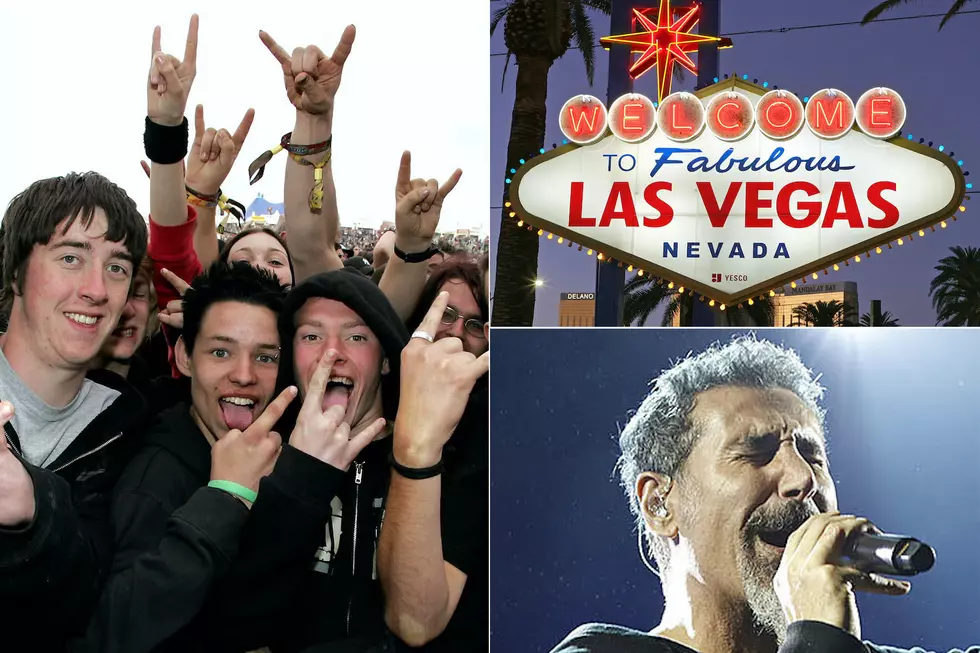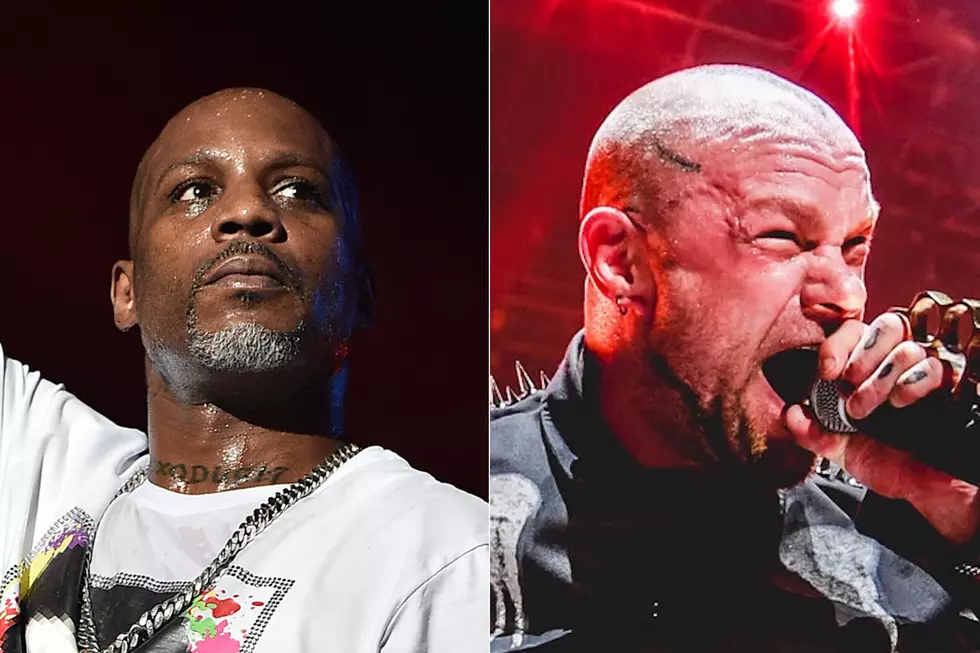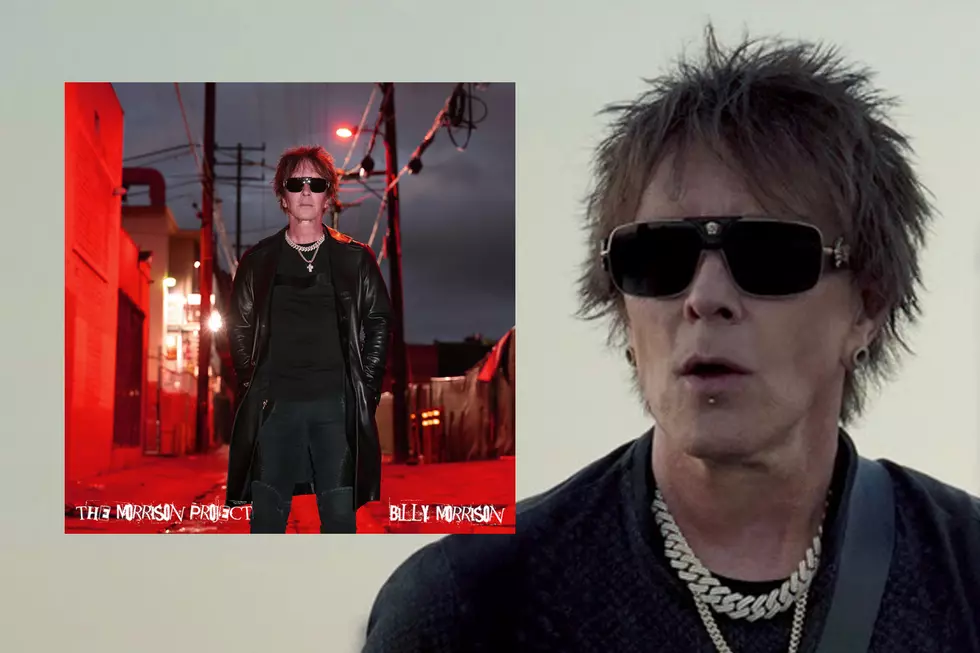
Authors Jon Wiederhorn + Katherine Turman Discuss New Book ‘Louder Than Hell’
'Louder Than Hell: The Definitive Oral History of Metal' hit bookstores on May 14, 2013. Written by longtime music journalists Jon Wiederhorn and Katherine Turman, 'Louder Than Hell' takes readers on a historical journey of one of our favorite genres in a unique way: Rather than Wiederhorn and Turman writing a standard narrative, they let those who experienced the stories tell them first-hand.
It's not everyday you can say a book is exciting, but 'Louder Than Hell' is monumental. Hanging out before their release party at Bowery Electric in New York City, which featured a blistering set from Iraqi thrash metal band Acrassicauda, the co-authors discussed their new book, some of the more surprising stories they unearthed and more.
At over 730 pages, 'Louder Than Hell' is a massive book. When you set out to write it, did you have any idea how big it would be?
Jon Wiederhorn: Actually, no! What happened was, I was going to be working on an authorized biography of Judas Priest, and I had been talking to my agent about that. The band was dragging their heels. I've been writing about bands for about 23 years now and I've developed a good relationship with Priest and a bunch of other bands. The book with Priest just didn't work out, but my agent asked if I had any other ideas. I told him I have about 1,000 interviews on my hard drive and access to most artists in the metal genre. So I thought, what about a book about metal, in the vein of 'Please Kill Me' by Legs McNeil and Gillian McCain, which is a punk rock book that is an oral history. It's the template for this book. My agent said fantastic. There have been a lot of great metal books, but they've all been narrative. So my agent said great, but he said I needed a co-author because this was going to be such a gargantuan task and it would take a little over a year to do. I thought about my options and it didn't take long until I thought of Katherine Turman, who I had worked for when she was at Rip magazine when she was the Editor. I was writing for Rolling Stone and she just started assigning me pieces. I did Megadeth, Soul Asylum and a bunch of other features. Many years later, she moves from Los Angeles to New York and is working for Alice Cooper. We had been friends and colleagues, and then I thought, "Wow, this is just perfect." She represents the West Coast and I represent the East Coast. She was raised in the era of hair bands and commercial metal, and I was much more a metal guy who started with Priest and blew up with thrash and the extreme stuff.
So when Jon came to you, what was your initial reaction?
Katherine Turman: I immediately said "Hell yeah!" For years, people were asking me when I was going to write my book. I never wanted to. I didn't want to tell my stories. It just seems self-serving and boring and embarrassing. This idea, though, was not just my voice. It was other people telling the stories and as a journalist, that's what I love. This was the perfect book for me to do.
Jon, you mentioned that you have thousands of interviews on your hard drive. How many interviews in the book were done specifically for the book?
Wiederhorn: There are over 400 interviews in 'Louder Than Hell.' We counted over 300 new ones. So I would say maybe 100 are old. The reason for that is some of these people are no longer with us, like Ronnie James Dio.
Turman: For me, being from LA, I interviewed Axl Rose and all of Guns N' Roses in the early days, and that's just not going to happen anymore. I was fortunate I had that archived.
How did the artists respond to the idea of the book?
Wiederhorn: Mostly, we got a great response. Some artists gave us hours of time. We talked to Phil Anselmo on three separate occasions. He's not a man who is easy to get off the phone. He wanted to help in any way possible. He loves metal, loves talking about it, loves talking about Pantera. Corey Taylor was immensely helpful. Scott Ian was great and he wrote the foreword for the book.
Turman: Everyone was pretty excited. The thing is, they all have to reiterate their most well-known stories and their early history. How many times do they have to tell the same story over and over, you know? But, we have good rapport with them and hopefully we asked questions that were a little more left-of-center. I think we did it in such a way that it wasn't annoying to them. We got deeper, we got better at it.
Wiederhorn: That's where the strongpoints in the book lie. We had Paul Di'Anno from Iron Maiden, who had lots of things to talk about, you know, about the band's early days.
Turman: We got Neil Turbin, the original Anthrax singer. They seem to never have talked much, and not that it was as bad as Metallica and Mustaine, but there was definitely still some animosity there.
Wiederhorn: It was great to get Brian Tatler from Diamond Head, too. He was so important to the New Wave of British Heavy Metal, but beyond that, he was Lars Ulrich's primary influence. Lars went overseas to England to see Diamond Head and stayed with Brian! He told us once that Lars wrote him a letter and said, "Hey man, I'm really trying to get my own band going." Brian's response? "Oh, yeah, um, you do that. Good for you, Lars."
There are obviously several crazy, shocking stories. But, if you had to pick just one, what surprised you the most? The story of former Pentagram member Joe Hasselvander blaming blood-soaked tarot cards for Cliff Burton's death really stood out to me.
Turman: There are so many amazing stories in the book, I forgot about that one! Thank you, that is my go-to story now!
Wiederhorn: What blew me away, specifically, were the personalities of some of the guys in these scenes, especially cross-over. I was a thrash fan growing up in DC. I liked Bad Brains and Agnostic Front and Sheer Terror and Cro-Mags…but I had no idea these guys were really dangerous motherf---ers. They lived these thug life existences. They wrote about their experiences and how they grew up and how they robbed drug dealers. They'd bring bottles into club shows in case they got in a fight. That really took me aback. It was one story after another. Those were the wildest stories in my mind.
Turman: One good thing about our collaboration is we have different strengths and likes. We have similar tastes, of course, but I was definitely a part of the whole Sunset Strip scene. I liked the dirtier, edgier, slimier stuff. In talking with some of those bands, the feuds are still there. I talked with Don Dokken and George Lynch and I got insight into their feud. Don told me about the Dokken feud and how it began over money. It was all downhill, despite their many hits. It started out on a bad foot financially and that was all it took.
Wiederhorn: It's funny, we've both been in the industry so long, we shouldn't have been shocked by these stories or developments because we've done interviews for years and years. But, to discover so many of these guys got ripped off by their labels and managers, it was really surprising. Slipknot told us about how a manager would pit one band member against the other. According to Jim Root, managers did things simply to blind the band members. Even on a smaller level, Brutal Truth's Kevin Sharpe told me that they would get tons of booze every night and have these huge parties, but they'd come back from the tour with like $100 bucks. All that booze and all those wild nights were there to simply blind them from the fact that they weren't getting any money.
I'm sure it's tough to be in that position, where everything is so exciting and fast-paced, and yet you still have to do business. Maybe this will help up-and-coming bands: This week, it was announced that a college in the UK will be offering a two-year degree in heavy metal.
Turman: Well, I'm not sure what job that prepares you for, except your job or our job. Or, if you're in a band. It's a noble calling, for sure.
Wiederhorn: You could teach other people about the history and sociology of metal. It's like being an art history major. It just fills you with knowledge. I think someone interested in doing this type of work is out of their mind, but should go to a school of communications. Just dive in.
Turman: If you think about college, there is certainly classical music departments. Why shouldn't heavy metal be elevated to that stature?
The two of you have written an exhaustive bible for metalheads across the world. You start from the beginning and you go to the present. Looking at where we are at now, in 2013, what do you think of the state of metal?
Wiederhorn: I think metal is an ever-evolving genre. The fans are so devoted to it. It won't go away the way you see flash-in-the-pan movements. There seems to be a new indie rock fad every month. A kid who grew up with Metallica is still probably loving Metallica in his 40s or 50s. If you're born a metalhead, chances are you will still cling to your love of metal. I think a lot of things turn around. The last band I saw that was completely groundbreaking was Slipknot. They came in with nu metal and threw in some industrial and death metal. Crazed percussion, nine guys, they blew everyone's mind. Somehow, they became mainstream, and to me that's really cool. I see Mastodon doing groundbreaking stuff. Tool is certainly not a new band, but they're constantly evolving. When you look at what's happening now, there's a real resurrection of doom, too. Ghost, for instance. They draw from a lot of elements from 70s metal. I think that type of music is back in a big way with groups like Ghost and Pilgrim.
Turman: I think there was a bidding war for Ghost, which hasn't seemed to happen since the 90s. Theatricality is a big thing with them. You know, I couldn't have said what was going to come after Marilyn Manson, but clearly it's Ghost, and I don't know what's coming next.
Wiederhorn: Once you take speed metal as far as you can, and you have black metal and death metal bands taking their music to the most extreme degree, you slow things down. Phil Anselmo is a proponent for those slower, sludgier bands. Sabbath have a new album, we'll see if that has a big impact. There is so much bands can draw from, you know? Post metal, I love, but it's not commercially huge. There are just so many types of metal now.
Turman: In the early days, you couldn't be a Slayer fan and a Poison fan. Now, even though there are still so many sub genres, I think it's much more cohesive and welcoming. Metal is metal.
For people who have yet to pick it up, describe 'Louder Than Hell' in one word.
Wiederhorn: Wildly entertaining.
Turman: That's two words, Jon. Epic.
Our thanks to Jon Wiederhorn and Katherine Turman for the interview. 'Louder Than Hell: The Definitive Oral History of Metal' is available for purchase at Amazon.com.
More From Loudwire

